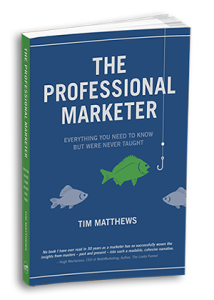Estimated Reading Time: 2 minutes
Interviews are critical to developing a good buyer persona. Actually speaking with the buyers can uncover insights that would never come to light otherwise. Simply creating a persona via research, using demographics, is a waste of time. You need to understand how they think, not just who they are.
 Many marketers never take this step. Contacting real buyers is a difficult and challenging task. And what do you ask them? Here are 13 questions to get you started, followed by a format for compiling your findings. You don’t have to ask all of these, or in this order. The most important thing is to let the buyer talk, and for you to listen.
Many marketers never take this step. Contacting real buyers is a difficult and challenging task. And what do you ask them? Here are 13 questions to get you started, followed by a format for compiling your findings. You don’t have to ask all of these, or in this order. The most important thing is to let the buyer talk, and for you to listen.
Role and Responsibility
- What is your role? What responsibilities do you have?
- What department are you in? What does your reporting structure look like?
- What is the biggest challenge to getting your job done?
Key Initiatives and Objectives
- What are your key initiatives? How do they relate to your business?
- What are the major hurdles to your accomplishing them?
- How does your organization measure success?
Buying Process and Decision Criteria
- What made you decide to buy a product like ours? What factors drove that decision?
- Take me back to the day you decided to start looking for products like ours. When was that, and how did it happen?
- What was it that finally convinced you to buy our product?
- Who else got involved in the decision and why?
Wild Cards
- If you could change one thing about your job, what would it be?
- How do you think your role compares with those of your peers?
- What advice would you give to college graduates looking to land a job like yours?
The questions you ask can take any form you think will give you the background and insight you are looking for. You will likely not get through all of them in an interview. Asking open-ended questions and listening carefully are essential to getting beyond merely courteous answers. You should probe and ask deeper second-level questions to get to the heart of the matter. Most important, just get the subject talking, telling his or her story.
After you have conducted half a dozen interviews, you probably will have accumulated enough material to build a profile. How many interviews you conduct, and if you segment by market or geography, are decisions you will need to make based on the nature of your business.
The buyer persona should be compiled into a short document that other members of the sales and marketing teams can reference. Content—insights—is more important than format, but a good B2B persona should contain the following:
- Profile – A brief description of the person—what the person’s title or role is, whom he or she reports to, typical career path, age range, and other useful details. Some people choose to name their personas for easy reference and to get to “know” them as a person. In my experience, I have found that this strategy more often than not causes cynicism on the part of those outside the process. A common mistake is to spend too much time on this piece of the persona, and not enough on the items below, which are where the real insights come from.
- Role and responsibility – What is this person’s job, and what is he or she responsible for? Understanding this completely, even in areas that don’t directly pertain to your product, can offer critical insights. For example, a nurse might make a recommendation to a doctor on a new piece of equipment, unofficially, and have some influence.
- Career aspirations – Who does this person want to be when he or she grows up? Perhaps your product can help this person get there. This can be the most powerful insight you gain from the interview. People always act on their personal motives.
- Purchasing process – Where does this person find information about products like yours (you should be advertising there), and how does he or she buy products like yours (make sure you have the right channel)?
- Blockers – What makes this person’s job difficult (time in the day, people, process), and what rivalries might exist with others? It is amazing what you will find out, and removing these blockers with your product or process can help ramp up your revenue.
Have other questions you have used? I would love to hear them.
 Want to learn even more about marketing?
Want to learn even more about marketing?